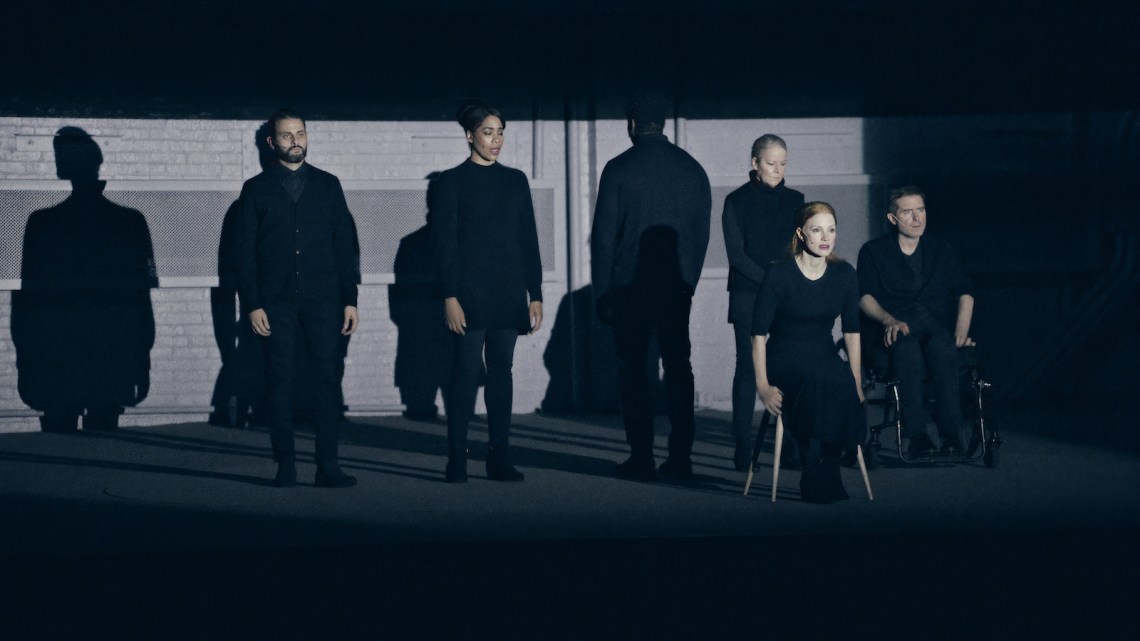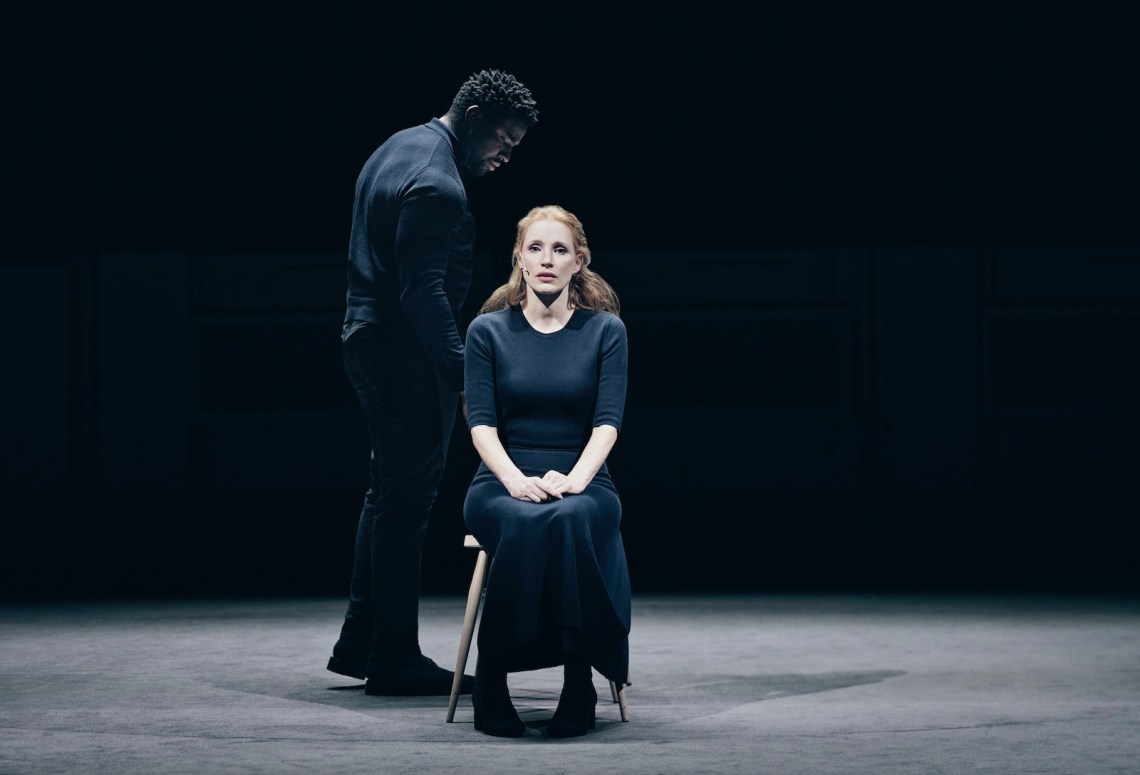When the house opens the curtain is already up. The black and gray bricks of the back theater wall are exposed, as are pipes and other infrastructure. The entire set consists of five simple chairs, and there are no props; when the actors speak of lighting cigars or handing rings to one another, they pause to make time for actions that never occur. Sometimes they move themselves, but more often turntables rotate beneath them, moving them closer together or farther apart. Everyone wears dark blue and black, and the actors have at least one important exchange with their backs to one another.
This is the new, stripped-down production of Henrik Ibsen’s A Doll’s House, directed by Jamie Lloyd from a script adapted by Amy Herzog, currently running at the Hudson Theatre in New York. With so little to look at, all the audience’s attention can be focused on bodies and faces, and also on words. I say this like it’s a good thing, and intellectually I think it is, but I should admit upfront that for the duration of this Doll’s House I found myself wishing that someone would get up and do something, and longing with a passion that took me by surprise for a sofa, an upholstered armchair, a window, a door. Even a lamp or a rug. Anything to give the smallest feeling of comfort, of being in a room.
A Doll’s House is the story of how Nora Helmer comes to a crucial decision—the decision of her life. We meet her on Christmas Eve, when she has just returned from doing the shopping. She and her husband Torvald are happy because he is about to start a big new job at the bank, and he will soon be making lots of money. Then Nora’s childhood friend, Kristine, unexpectedly pays a visit. Kristine’s life has not been easy; she is a widow and has had to work to support her mother and brothers. Nora explains that her life has also not been easy. Eight years ago, when Torvald was seriously ill, the doctors advised Nora to take him south to convalesce. But they couldn’t afford the journey, and Torvald, kept in the dark about how sick he was, refused to borrow money. Desperate, Nora told Torvald that her dying father had given them the money, but in fact she secretly borrowed it from a man named Krogstad, and has been scrimping and scrambling to pay off the debt ever since.
Things grow more complicated when Nora asks Torvald to give Kristine a job, which he does by firing Krogstad, who is now his underling at the bank. Krogstad arrives to threaten Nora, saying that if he loses his job, he will tell Torvald about the debt. (Krogstad and Kristine have a longer history, the details of which are revealed later in the play.) Krogstad also tells Nora that he knows she forged her father’s signature on the promissory note. In the end Torvald learns what happened, and his reaction prompts Nora to leave him and the children. Among Ibsen’s contemporaries, this decision was so controversial that not only did he write an alternative ending for the German theater, but social invitations in Stockholm reportedly came with an advisory: “You are requested not to mention Ibsen’s A Doll’s House!”
Moralists condemned Nora—one critic referred to Ibsen’s “hideous” third act—and political radicals approved of her. A play in which a woman who has been kept down at last rises up and seizes her life would be fine, but that is not exactly Ibsen’s point. Nora is not an unwitting victim of Torvald or even of society. She has found pleasure and satisfaction in her doll’s life; she has been an all-too-willing cocreator of her predicament. Her great insight is not that she has been oppressed but that her life has been a form of playacting.
Yet it would be too simplistic to say that theatricality is the “problem”—it is also the means by which the problem is starkly revealed. As Toril Moi put it in the excellent book Henrik Ibsen and the Birth of Modernism (2006), what makes Ibsen modern is “the sense that we need theater—I mean the actual art form—to reveal to us the games of concealment and theatricalization in which we inevitably engage in everyday life.” Nora is not over there, in the past, with us over here in the great liberated present. Claiming oneself as a human being, as Nora famously does, is something you have to do for yourself; even the most egalitarian system (which we don’t have, anyway) can’t do it for you.
*
The rules of Lloyd’s game are very strict. Nora (Jessica Chastain) assumes her chair while the audience is taking their own seats, arms crossed and expression grim, as the rotating mechanism brings her nearer and farther away in a regular, wide swoop. (The casting of Hollywood actors in Broadway plays can seem like a ploy for ticket sales, but Chastain is a very plausible and moving Nora. She is vain, childlike, steely, and desperate—all the necessary qualities.) The effect is rather like an amusement park ride, but there is nothing fun about it. For the entirety of the play, she is stuck in place, even immobilized.
Advertisement
I counted three times when she left the chair during the performance. The first time she rises up to greet her old friend Kristine (Jesmille Darbouze) and instantly sits back down. The second time she practices the tarantella. This is supposed to be a moment of exaggerated intensity. Nora is trying to distract Torvald (Arian Moayed) from looking at the mailbox, where Krogstad (Okieriete Onaodowan) has placed a letter revealing all. But instead of leaping into the middle of the room and dancing wildly, as the original stage directions call for, Chastain falls to the floor, thrashing and kicking in place. Many actresses and directors, Moi notes, have “wished to tone down the sheer theatricality” of the tarantella and “preserve Nora’s dignity.” It is to the great credit of Lloyd and Chastain that they make no such effort, but instead transform the tarantella into something bizarre and awkward and disturbing, in which Chastain seems less a fully grown woman expressing desire than a child in the grips of a tantrum.
The third time, of course, is when she walks off the stage. Still, it would be a mistake to say that only Nora is constrained. Everyone in A Doll’s House suffers under the binding ties of patriarchy, even the person whom it seems to privilege most. Torvald can walk downstage and upstage, moving toward Nora and away from her. But he is hardly free. In the third act, when Nora’s deception comes to light, he does not stride across the stage in anger or even gesture in a way that could be described as wild or large. He writhes in his chair, clasping his useless hands together; at one point he stretches his arms over his head and lets them fall to his lap again. At the very end, he moves his chair directly next to hers, so they seem to be lashed in place together. When she stands to exit, he remains seated. He has legal and social power, but throughout the play Nora knows more than he does. She knows the truth about his illness, and the money; and she knows that the little games they play with each other are just that—games, fantasies, roles.
Herzog and Lloyd make a number of interesting and clarifying alterations. Nora’s children are not played by actors onstage; she speaks with their recorded voices. (When Nora plays hide-and-seek with the invisible children from her chair, the effect is uncanny and beautiful, her face dropping and lifting like a mask taken off and put on again.) When Torvald complains that Krogstad is overly familiar with him, Herzog adds contemporary texture, so that Krogstad is said to use not just Torvald’s first name but an embarrassing childhood nickname: “It’s a power play. He just loves bursting out with ‘Torvey this’ and ‘Torvey that.’” In earlier translations of the play, Torvald calls Nora his “skylark” or “squirrel”; here he calls her not just “my little bird” but also “baby.” In Moayed’s mouth, this “baby” is like a puff pastry of manipulation and infantilization. Actually, all of Moayed’s choices are smarmy and brilliant; he brings a fragile masculinity and subtle misogyny to the role that are revelatory.
*
A question: Why did Nora forge the note to borrow the money to save Torvald in the first place? It is not enough to say, “Because she loved him”—you might love someone very much and therefore be motivated to honor their wishes no matter how self-destructive they might be. But his death is not an option for Nora. Here is how three other translations have handled Ibsen’s original text, at the point when Nora explains her motivations to Kristine:
“Aha, I thought, now you’ll just have to be saved—and that’s when I saw my chance.” (Rolf Fjelde)
“All right, I thought, somehow you’ve got to be saved. And it was then I found a way…” (James McFarlane)
“Well, I thought, you’ve got to be rescued; and so I found a way out—” (Deborah Dawkin and Erik Skuggevik)
And this is Herzog:
Advertisement
Well, I thought. You’re not allowed to die, so I’ll just have to figure something out. And I did.
A Nora who wants to rescue or save Torvald is a Nora who has imagined herself as the heroine in a melodrama. But a Nora who believes that Torvald is not allowed to die is different: her fantasy is that she is Torvald’s mother, setting rules that he must follow, making choices he doesn’t like but can’t see are in his best interests. This Nora is pushing back against being the “baby,” but still from within a fantasy of playing house: she is pretending to be mommy.
When Torvald first learns what Nora has done he reacts with fury and panic, calling her a criminal and telling her she can no longer be trusted with the children. After he reads a second letter from Krogstad promising to keep the information secret, he pivots to joy and relief, telling Nora that they can forget everything he just said. In Herzog’s adaptation:
I think I even love you a little more than I did half an hour ago. Because there’s this new tenderness, too, that’s almost like…it’s almost like I feel with Ivar or Bobby when they’ve done something wrong and they cry and cry…
Torvald always treated Nora as a child; she was motivated to get the money by her own desire to treat him as a child; now that all the facts have come to light, he imagines her even more as a child—a bad little girl repenting to her father. The problem, it turns out, isn’t that Torvald is humiliated by the debt; it’s that he is capable of turning the situation on its head, recasting it according to the script and roles he’s most comfortable with. He can make even Nora’s most independent action into another game of dependency.
*
But she won’t let him, of course. That is what remains, more than a hundred years after it was written, so thrilling—this moment when Nora refuses to keep playing. “Sit down,” she says in one of the play’s most famous lines. “We have a lot to talk about.” In Ibsen’s original, Nora uses the word vidunderlig to explain to Torvald why she no longer loves him. The major translations of A Doll’s House use the word “miraculous” for vidunderlig. It’s not a perfect replacement: according to Tore Rem, a scholar at the University of Oslo, vidunderlig lacks the valence of religion. (“Wonderful” is close, but not strong enough.) I am quoting here from Deborah Dawkin and Erik Skuggevik’s translation:
It was tonight, when the miraculous thing didn’t happen; because then I saw that you weren’t the man I’d imagined…. I’ve waited so patiently now for eight years; because, good Lord, I realized that miraculous things aren’t exactly an everyday event. Then this crushing blow came at me; and I was so unshakeably certain: something miraculous will come now…
The vidunderlig thing is the rather elaborate fantasy that, first, Torvald would take the blame for Nora’s transgression; second, that Nora, unwilling to allow this noble self-sacrifice, would tell everyone that the debt and forgery were solely her own doing; and third, that no one would believe her. In order to prevent Torvald from committing this act of heroism, Nora had resolved to end her life—a perfect ending to a melodrama. But now that she has learned that he was not moved to heroism, she won’t end her life; she would rather end her marriage and seek an education in the great outside world. In the final exchange of the play, when Torvald asks Nora what would have to happen for her to return, she calls it “the most vidunderlig thing,” with the implication that such a thing is far beyond possibility.
Helmer: Name me this miraculous thing!
Nora: Then both you and I would have to change ourselves in such a way that—. Oh, Torvald, I no longer believe in the miraculous.
Helmer: But I want to believe in it. Name it! Change in such a way that—?
Nora: That our living together could become a marriage. Goodbye.
The word Herzog uses for vidunderlig is “beautiful,” a choice that quietly alters the meaning of the play. Wishing for a beautiful thing, rather than a miraculous or wonderful one, implies that Torvald was not the only prisoner of aesthetic idealism in the room. “I’m sorry,” Nora tells him as she leaves. “I don’t believe in beautiful things happening anymore.” She has seen her own complicity.
Having Nora give up on beauty implies a loss of faith in aesthetics or an aestheticized life, cementing the contrast between what is “real” and what is art. When Chastain rises from her chair at the end of this production, she exits not into the wings but directly out a lifted garage door at the back of the theater, onto Forty-fifth Street. She looks right and left, as if unsure of which way to go, then descends the stairs and strides off. Her carriage is perfectly erect. She has walked away from theater itself. “I’m a human being,” she said. “Or at least I’m trying to become one.” But Torvey—poor Torvey!—is only an actor. He doesn’t get to leave the stage.




